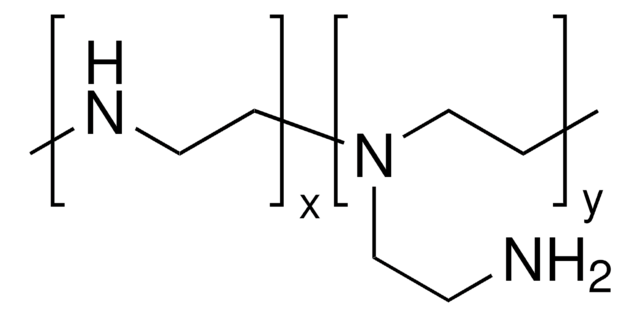482595
Poly(ethyleneimine) solution
average Mn ~1,200, average Mw ~1300 by LS, 50 wt. % in H2O
Synonym(s):
Ethyleneimine polymer solution, PEI
About This Item
Recommended Products
mol wt
average Mn ~1,200
average Mw ~1300 by LS
Quality Level
concentration
50 wt. % in H2O
refractive index
n20/D 1.454
viscosity
200-500 cP(25 °C)(lit.)
density
1.08 g/mL at 25 °C
InChI
1S/C2H5N/c1-2-3-1/h3H,1-2H2
InChI key
NOWKCMXCCJGMRR-UHFFFAOYSA-N
Looking for similar products? Visit Product Comparison Guide
General description
Application
Signal Word
Warning
Hazard Statements
Precautionary Statements
Hazard Classifications
Aquatic Chronic 2 - Skin Sens. 1
Storage Class Code
10 - Combustible liquids
WGK
WGK 2
Regulatory Listings
Regulatory Listings are mainly provided for chemical products. Only limited information can be provided here for non-chemical products. No entry means none of the components are listed. It is the user’s obligation to ensure the safe and legal use of the product.
JAN Code
482595-100ML:
482595-VAR:
482595-BULK:
482595-250ML:
Choose from one of the most recent versions:
Already Own This Product?
Find documentation for the products that you have recently purchased in the Document Library.
Customers Also Viewed
Articles
New methods for materials fabrication at the micro- and nanoscale will drive scientific and technological advances in areas of materials science, chemistry, physics, and biology. The broad diversity of potentially relevant materials, length scales, and architectures underscores the need for flexible patterning approaches. One important example is the fabrication of 3D periodic structures composed of colloidal, polymeric, or semiconductor5 materials.
Gene therapy has become one of the most discussed techniques in biomedical research in recent years.
We present an article that discusses two applications in particular; first, using these layers as polyelectrolyte membranes to control permeability.
Our team of scientists has experience in all areas of research including Life Science, Material Science, Chemical Synthesis, Chromatography, Analytical and many others.
Contact Technical Service




![[2-(Methacryloyloxy)ethyl]dimethyl-(3-sulfopropyl)ammonium hydroxide 95%](/deepweb/assets/sigmaaldrich/product/structures/217/219/73c91e1c-0ee4-4b3d-bead-a6dc3d09d1da/640/73c91e1c-0ee4-4b3d-bead-a6dc3d09d1da.png)





